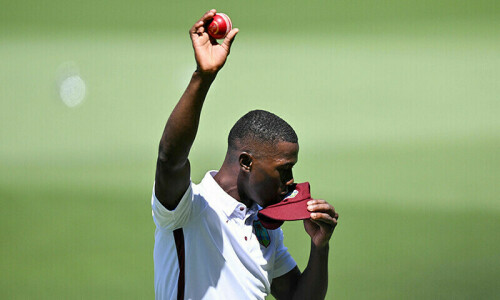MANCHESTER: Front-foot no-ball technology that will see the TV umpire alone deciding whether a bowler has over-stepped will be used for the first time on a trial basis in Test cricket during the England-Pakistan series, which started on Wednesday, the International Cricket Council (ICC) has said.
Currently, the responsibility for calling no-balls lies with the on-field umpires.
They can, however, call on their colleague in the replay booth for assistance if they feel a wicket may have been taken with an illegal delivery. TV umpire Michael Gough made the first call in the brief afternoon session of by relaying to on-field umpires that James Anderson had overstepped.
But many observers have argued this procedure is unfair to bowlers given that, with on-field officials encouraged to concentrate on the batsman’s end, they may not realise they are over-stepping and rectify their delivery stride until it costs them a wicket.
Under the new system, however, the TV umpire will monitor the front foot after each ball and tell his on-field colleagues if an illegal delivery has been bowled.
“Front foot no ball technology to be used in ICC World Test Championship series featuring England and Pakistan, with the support of both teams,” the global governing body tweeted on Wednesday. “Performance of the technology in these Tests will be reviewed before any decisions taken on its future use in Test cricket.”
The new procedure should also avoid the kind of situation umpire Richard Illingworth, one of the standing officials in the first Test between England and Pakistan at Old Trafford, found himself in 2016 when he incorrectly called New Zealand’s Doug Bracewell for a no-ball that had bowled Australia’s Adam Voges during a Test in Wellington.
There was no way of rectifying Illingworth’s mistake and Voges, who was on seven at the time, went on to score a double century that was central to an Australia victory.
The ICC have already trialled the technology during the women’s Twenty20 World Cup in Australia earlier this year and it has also been used in men’s 50-over international matches.
But the ICC now want to see what benefits it brings to cricket’s longest format before deciding whether it becomes a permanent feature across all of the international game.
Published in Dawn, August 6th, 2020














































